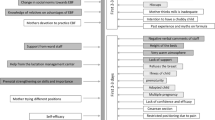Abstract
Objective
To assess the effectiveness and feasibility of on the job staff training and supportive supervision to improve six months Exclusive Breastfeeding (EBF).
Methods
A longitudinal study was conducted in a public health field practice area-Sri Lanka in 2006–2007. Three breastfeeding counseling sessions were conducted for public health midwives. Supportive supervision and on the job training were done by two public health physicians. Pre and post intervention independent cross sectional studies were conducted to assess the effectiveness of the programme. The study sample consisted of mother-infant pairs where infants were aging 6 to 12 months, attending child welfare clinics. Primary outcome measure was the proportion of infants who received EBF up to 6 months. Logistic regressing model was used for analysis of predictors of EBF.
Results
Study sample consisted of 336 mother-infant pairs (pre 139, post 197). Proportion of mothers who breastfed their infants exclusively for six months improved from 19% to 70% after the intervention. The median duration of EBF increased from 4 months to 6 months (inter-quartile range 2–6 and 5–6 months respectively). Unconfounded effect of intervention on 6 months EBF in logistic regression model was highly significant (OR=13.67. p<0.001). Intervention significantly reduced the bottle feeding rate (OR=0.212, p<0.001) but not formula feeding (OR=1.146. p=0.642). Of potential predictors assessed. Sinhalese mothers than Muslim mothers (OR=3.37, p<0.001) and employed mothers compared to housewives (OR=4.45. p=0.014) were more likely to breastfeed their infants upto six months. Parity, maternal education and maternal age were not significantly associated with six months EBF.
Conclusions
The existing public health infrastructure can be used effectively to improve six months EBF in places where the care is given primarily by public health system.
Similar content being viewed by others
References
World Health Organization. Global Strategy for Infant and Young Child Feeding, The Optimal Duration of Exclusive Breastfeeding. Geneva, Switzerland: World Health Organization, 2001.
National Health and Medical Research Council. Dietary Guidelines for Children and Adolescents in Australia incorporating the Infant Feeding Guidelines for Health Workers. Australia; Canberra, Commonwealth Department of Health and Ageing, 2003.
American Academy of Paediatrics Section on Breastfeeding. Breastfeeding and the Use of Human Milk. Pediatrics 2005; 115: 496–506.
Canadian Pediatric Society. Exclusive breastfeeding should continue to six months. Pediatrics & Child Health 2005; 10: 148.
Wilmoth TA, Elder JP. An assessment of research on breastfeeding promotion strategies in developing countries. Soc Sci Med 1995; 41: 579–594.
World Health Organization. Exclusive Breastfeeding Nutrition, Infant and Young Child. Swisterland; Geneva, World Health Organization.
WHO/UNICEF. Breast feeding counseling: a training course. Switzerland; Geneva, World Health Organization.
Braun ML, Giugliani ER, Soares ME, Giugliani C, de Oliveira AP, Danelon CM. Evaluation of the Impact of the Baby-Friendly Hospital Initiative on Rates of Breastfeeding. Am J Public Health 2003; 93: 1277–1279.
Guise JM, Palda V, Westhoff C, Chan BK, Helfand M, Lieu TA. The Effectiveness of Primary Care-Based Interventions to Promote Breastfeeding: Systematic Evidence Review and Meta-Analysis for the US Preventive Services Task Force. Ann Fam Med 2003; 1: 70–78.
Anderson AK, Damio G, Young S, Chapman DJ, Pérez-Escamilla R. A Randomized Trial Assessing the Efficacy of Peer Counseling on Exclusive Breastfeeding in a Predominantly Latina Low-Income Community. Arch Pediatr Adolesc Med 2005;159:836–841.
Dennis CL, Hodnett E, Gallop R, Chalmers B. The effect of peer support on breast-feeding duration among primiparous women: a randomized controlled trial. CMAJ 2002; 166: 21–28.
Wong EHY, Nelson EAS, Choi K-C et al. Evaluation of a peer counselling programme to sustain breastfeeding practice in Hong Kong [Provisional PDF]. International Breastfeeding Journal 2007; 2.
Morrow AL, Guerrero ML, Shults J et al. Efficacy of home-based peer counselling to promote exclusive breastfeeding: a randomised controlled trial. Lancet 1999; 353: 1226–1231.
Department of Census and Statistics in collaboration with Ministry of health nutrition and welfare 2002. Sri Lanka Demographic and Health Survey. 2000 Sri Lanka: Colombo, Department of Census and Statistics, 2003.
International Baby Food Action network. The state of the world’s breastfeeding, Sri Lankan report card. India; New Delhi, IBFAN Asia Pacific, 2007.
Jayathilaka A, Fernando D. Counseling on breast feeding: effectiveness of an educational intervention for health workers, in promoting breast feeding practices in the community. J College Communi Physic Sri Lanka 2004; 9: 28–31.
Agampodi SB. Annual Action Plan 2007, MOH area-Beruwala: Sri Lanka; Beruwala, Medical Officer of Health Office, 2007.
Agampodi SB, Agampodi TC, Piyaseeli UKD. Breast feeding practices in Medical Officer of Health area Beruwala. The Eleventh Annual Academic Sessions of the College of Community Physicians of Sri Lanka. Colombo, 2006:16.
Hsieh FY, Block DA, Larsen MD. A Simple Method of Sample Size Calculation for Linear and Logistic Regression. Stat Med 1998; 17: 1623–1634.
Agampodi SB, Agampodi TC, Piyaseeli UKD. Breastfeeding practices in a public health field practice area in Sri Lanka: a survival analysis. International Breastfeeding Journal 2007; 2.
Jayathilaka A, Fernando DN. A Community Based study on Breast Feeding Practices in Gampaha District. J College Communi Physic Sri Lanka 2002; 7: 32–36.
Labbok M, Krasovec K. Toward consistency in breastfeeding definitions. Studies in Family Planning 1990; 21: 226–230.
Labbok MH, Coffin CJ. A call for consistency in definition of breastfeeding behaviours. Soc Sci Med 1997; 44: 1931–1932.
DCS online. Number and percentages of population by district. Census 2001. Department of Census and Statistics. Sri Lanka 2007.
Agampodi SB. Utilization of Private Sector for Immunization of Children in Colombo Municipal Council Area Post Graduate Institute of Medicine. Colombo. University of Colombo, 2005:94.
Popkin B. Breast-feeding determinants in low-income countries. Medical Anthropology 1987; 7: 1–31.
Simopoulos AP, Grave GD. Factors associated with the choice and duration of infant-feeding practice. Pediatrics 1984; 74: 603–614.
Forman MR. Review of Research on the Factors Associated with Choice and Duration of Infant Feeding in Less-Developed Countries. Pediatrics 1984; 74: 667–694.
Author information
Authors and Affiliations
Corresponding author
Rights and permissions
About this article
Cite this article
Agampodi, S.B., Agampodi, T.C. Effect of low cost public health staff training on exclusive breastfeeding. Indian J Pediatr 75, 1115–1119 (2008). https://doi.org/10.1007/s12098-008-0185-4
Received:
Accepted:
Published:
Issue Date:
DOI: https://doi.org/10.1007/s12098-008-0185-4




